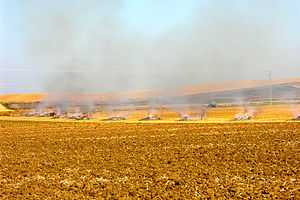Battle of Écija (1275)
| Battle of Écija | |||||||
|---|---|---|---|---|---|---|---|
| Part of the Reconquista | |||||||
 Farmland near Écija near the spot where Nuño González de Lara was killed and decapitated. | |||||||
| |||||||
| Belligerents | |||||||
|
|
| ||||||
| Commanders and leaders | |||||||
|
|
| ||||||
Part of a series on the |
|---|
| History of Spain |
.svg.png) |
|
|
| Timeline |
| Spain portal |
The Battle of Écija was a battle of the Spanish Reconquista that took place in September of 1275. The battle pitted the Muslim troops of the Nasrid Emirate of Granada and its Moroccan allies against those of the Kingdom of Castile and resulted in a victory for the Emirate of Granada.
The Battle
The Nasrid Emirate of Granada was engulfed in a civil war and was being regularly devastated by Castilian forces who saw an opportunity for easy plunder due to the distraction of the Muslim forces. Muhammad II asked for help from his Moroccan allies to ease the difficulty of fighting two wars at once. The Moroccan Sultan, the Marinid Abu Yusuf Yaqub ibn Abd Al-Haqq, landed on the Iberian Peninsula in 1275 with an army and began a campaign with the strategic objective to occupy the city of Tarifa. the Castilian King, Alfonso X of Castile was preparing a larger campaign against the two armies and sent forces to delay any Marinid advances.
While on this route, the Muslim forces encountered a Castilian army under the command of Nuño González de Lara "el Bueno", member of the House of Lara, who were attempting to cut off the Marinid route north near the town of Écija. The Marinid forces routed the Castilian army and Nuño González de Lara was killed in the action along with one of the sons of King Alfonso X, Ferdinand de la Cerda.[1] The Marinid Sultan ordered that Nuño González' head be cut off, sending it as a trophy to the Sultan of Granada, Muhammad II and cementing his alliance with them which would continue for the next few years against the Castilian forces.
In October, a second army led by the Archbishop, Sancho II of Toledo met a similar defeat but was saved in the last minute by the infante Sancho of Castile who rallied the Castilian forces. At the end of the year, King Alfonso X of Castile was forced to sign a peace treaty with the Muslims.
See also
- Nuño González de Lara "el Bueno"
- Alfonso X of Castile
- Reconquista
References
- ↑ Gonzalo Martínez Díez (ed.). El Condado de Castilla, 711-1038: La Historia Frente a La Leyenda. Retrieved 11-01-2010. Check date values in:
|accessdate=(help)